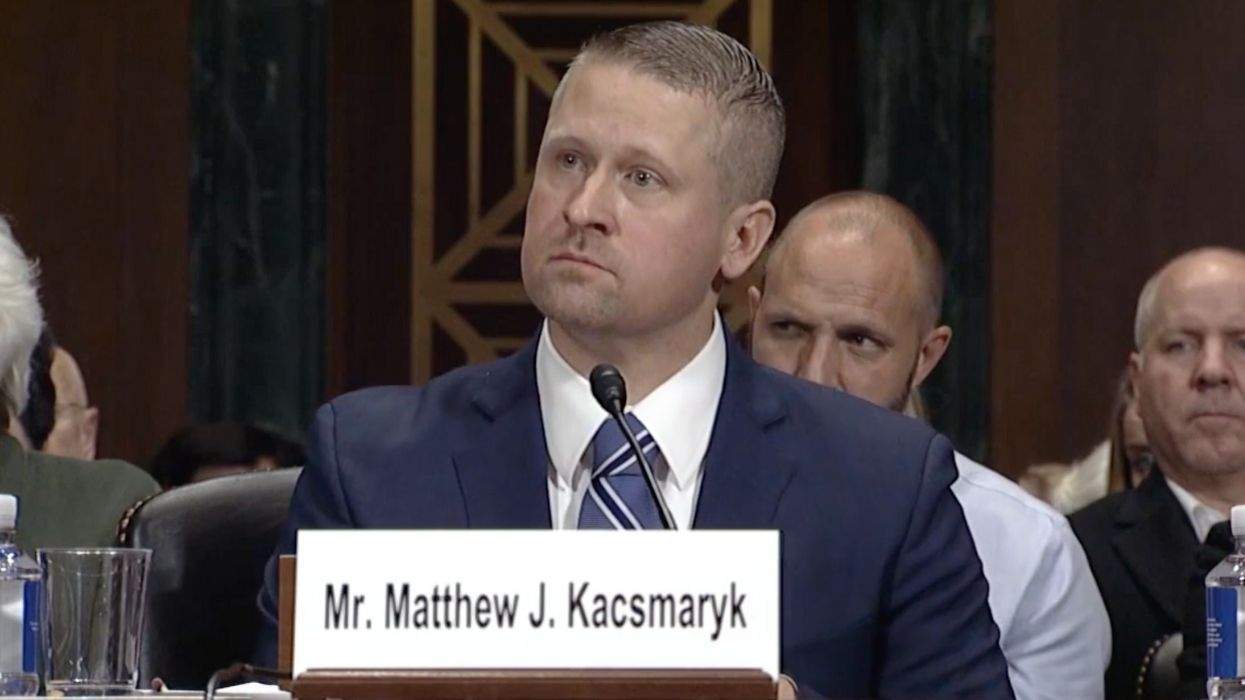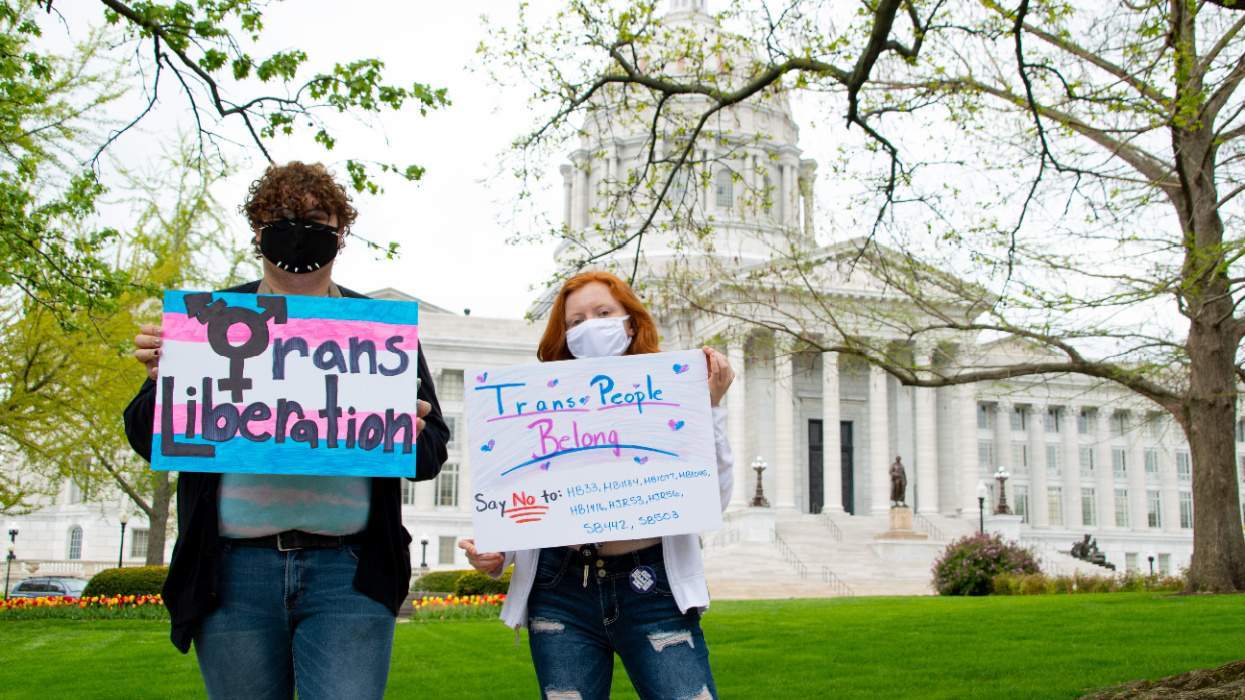Federal judges have temporarily blocked most provisions of the Tennessee and Kentucky bans on gender-affirming care for transgender minors.
The preliminary injunctions against these laws mean that trans youth in both states will be able to receive puberty blockers and hormone therapy while lawsuits against them are heard. The Tennessee injunction, issued Wednesday, let the ban on gender-affirming surgeries for minors stand, as those surgeries are not recommended for people under 18 anyway. The Kentucky suit dealt only with the portions of the law banning puberty blockers and hormones, so the surgery ban also was excluded from the injunction, which came down Monday.
The respective judges found that those who brought the suits, including families with trans children as well as doctors, were likely to succeed in proving their cases. There have been multiple federal court rulings blocking similar laws. The laws permit use of the medications to treat minors for conditions other than gender dysphoria, such as early-onset puberty — in other words, for cisgender minors but not trans ones.
“Plaintiffs have met their burden of demonstrating that [Tennessee’s Senate Bill 1] is most likely unconstitutional on its face … and a state-wide injunction is typically an appropriate remedy in such circumstances,” wrote Judge Eli Richardson of the U.S. District Court for the Middle District of Tennessee.
In the Tennessee suit, L.W. v. Skrmetti, the plaintiffs contend that the law violates the due process clause of the U.S. Constitution’s Fourteenth Amendment because it interferes with parents’ ability to control their children’s health care and violates that amendment’s equal protection clause because it “imposes disparate treatment on the bases of transgender status and sex and is not substantially related to an important state interest,” Richardson noted in his ruling.
The plaintiffs have not only demonstrated the likelihood that the law is unconstitutional but also have shown that denial of care would cause “irreparable harm” to trans youth, he continued. He added, “The Court acknowledges that the state feels strongly that the medical procedures banned by SB1 are harmful to minors. The medical evidence on the record, however, indicates otherwise.”
The plaintiffs are Samantha and Brian Williams and their trans daughter, two anonymous families with trans children, and Dr. Susan N. Lacy. They are represented by the American Civil Liberties Union and its Tennessee affiliate, Lambda Legal, and the law firm of Akin Gump Strauss Hauer & Feld LLP. The defendants are Tennessee Attorney General Jonathan Skrmetti, the Tennessee Department of Health, the Tennessee Board of Medical Examiners, and various other state officials.
Tennessee Gov. Bill Lee signed the ban into law in March. His state has been a leader in anti-LGBTQ+ legislation, including a law restricting drag performances, which has been struck down by a federal court.
In Kentucky, the ban on gender-transition procedures for minors was part of Senate Bill 150, which also includes restrictions on public schools’ instruction on LGBTQ+ topics. Gov. Andy Beshear, a Democrat, had vetoed the bill, but the Republican-majority legislature overrode his veto in March, so the bill became law.
Seven trans minors and their parents sued over the parts of the law blocking trans youth’s access to puberty blockers and hormones, naming several state officials as defendants. The suit is known as Doe v. Thornbury.
However, some of the defendants did not oppose the preliminary injunction. They are William C. Thornbury Jr., president of the Kentucky Board of Medical Licensure; Audria Denker, president of the Kentucky Board of Nursing; and Eric Friedlander, secretary for the Cabinet of Health and Family Services.
“Indeed, Denker and Thornbury note that ‘it would behoove KBML/KBN-licensees and their patients for the Court to grant the injunction and maintain the status quo pending final ruling on the merits of the suit, to avoid potentially unnecessary cost, time, and harmful exposure should Plaintiffs be successful,’” Judge David Hale of the U.S. District Court for the Western District of Kentucky wrote in approving the injunction. Kentucky Attorney General Daniel Cameron opposed the injunction.
Like the Tennessee judge, Hale found that the plaintiffs are likely to succeed in proving that the ban would violate the constitutional guarantees of equal protection and due process, and that trans minors would suffer “serious consequences” if the ban is allowed to stand.
“It should go without saying that enjoining enforcement of SB 150 will not result in any child being forced to take puberty-blockers or hormones; rather, the treatments will continue to be limited to those patients whose parents and healthcare providers decide, in accordance with the applicable standard of care, that such treatment is appropriate,” Hale added.
The plaintiffs in the Kentucky suit are represented by the ACLU of Kentucky, the National Center for Lesbian Rights and Morgan, Lewis & Bockius LLP.
Lawyers in both cases praised the rulings. “This is a critical victory for transgender youth, their families, and their medical providers across the state,” Joshua Block, senior staff attorney for the ACLU’s LGBTQ & HIV Project, said in a press release announcing the Tennessee decision. “Across the country, we’re seeing a clear and unanimous rejection of these laws as unconstitutional, openly discriminatory, and a danger to the very youth they claim to protect.”
“Today’s ruling tells transgender youth in Tennessee that they are seen, their lives matter, and that they have the right to access this lifesaving care,” added Sruti Swaminathan, Lambda Legal staff attorney for youth. “We are so grateful for our brave Plaintiff families and provider for standing up against this harmful law.”
Of the other injunction, ACLU of Kentucky Legal Director Corey Shapiro issued a statement saying, “We are grateful to the Court for enjoining this egregious ban on medically necessary care, which would have caused harm for countless young Kentuckians. This is a win, but it is only the first step. We’re prepared to fight for families’ right to make their own private medical decisions in court, and to continue doing everything in our power to ensure access to medical care is permanently secured in Kentucky.”
“This decision is a huge relief for the families targeted by this unnecessary and harmful law, which prevents doctors from doing their jobs and parents from making medical decisions for their own children,” added NCLR Legal Director Shannon Minter. “We are grateful that the court carefully considered all of the evidence and recognized that there is no support for this dangerous and unprecedented law.”
Federal courts in Alabama, Arkansas, Florida, and Indiana have also issued injunctions against bans on gender-affirming care, and the court in Arkansas has gone a step further by striking down that state’s law, the first ruling on such a law’s merits. The Arkansas attorney general plans to appeal. In Oklahoma, the ACLU and its state affiliate reached an agreement with the Oklahoma attorney general that the state’s ban would not be enforced while a lawsuit proceeds.















Charlie Kirk DID say stoning gay people was the 'perfect law' — and these other heinous quotes
These are some of his worst comments about LGBTQ+ people made by Charlie Kirk.